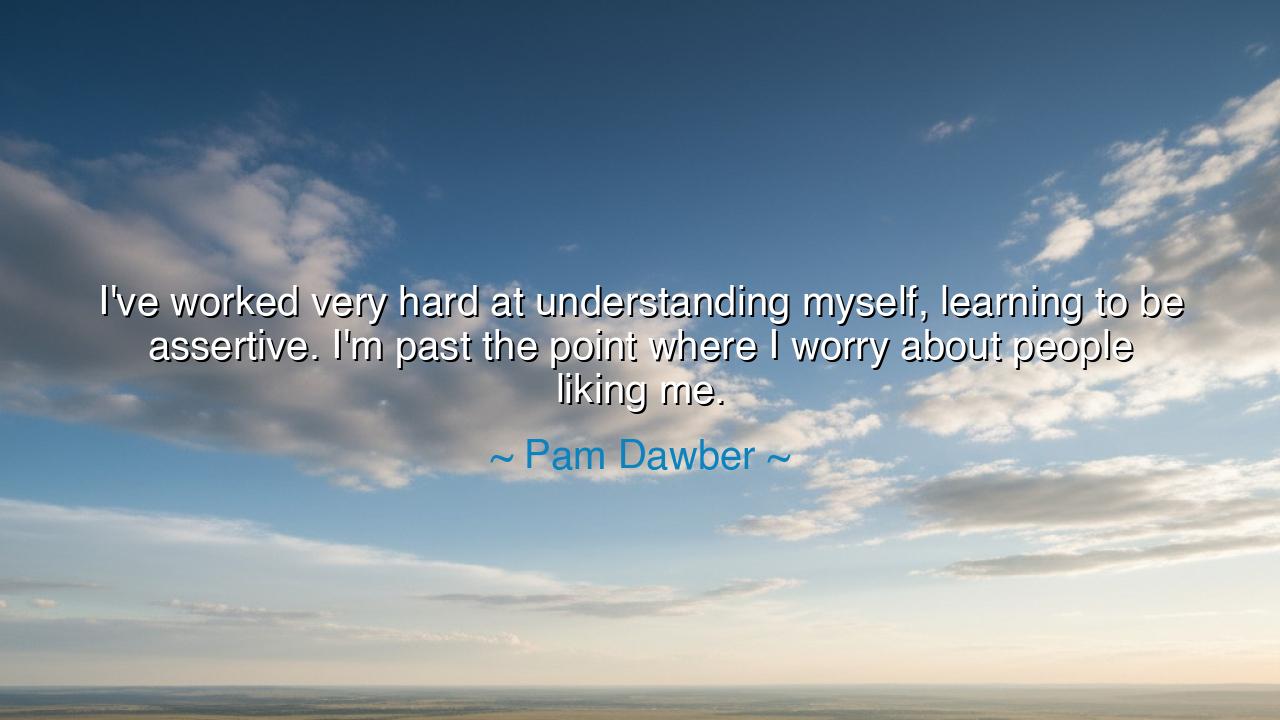
I've worked very hard at understanding myself, learning to be
I've worked very hard at understanding myself, learning to be assertive. I'm past the point where I worry about people liking me.






“I’ve worked very hard at understanding myself, learning to be assertive. I’m past the point where I worry about people liking me.” — Pam Dawber
In this saying, there breathes the spirit of self-knowledge, courage, and freedom. The words are simple, yet they strike the heart like a temple bell calling the soul to awakening. To understand oneself is among the oldest and noblest quests of humankind — the journey inscribed above the oracle of Delphi: “Know thyself.” Pam Dawber’s words echo that same wisdom, spoken anew in the voice of one who has endured the storms of approval and rejection, and emerged unshaken. She speaks of a victory not over others, but over the self — that restless self that bends beneath the eyes of the crowd, longing to be liked, fearing to be alone.
To be assertive is not to be loud or unkind, but to stand rooted in one’s truth, like an oak that does not bow before every wind. The ancients would have called this virtue — not the timid meekness of yielding, but the noble firmness of one who knows what is right and will not betray it. Dawber’s assertion reveals a life transformed: from a self that sought peace through others’ smiles, to a self that finds peace in its own stillness. This transformation is not sudden; it is earned through years of labor in the unseen chambers of the heart, where one wrestles with doubt, fear, and the desire to please.
Consider the tale of Socrates, the philosopher of Athens. He walked the streets barefoot, questioning the powerful, defying the tides of public opinion. The people mocked him, accused him, and finally condemned him to death. Yet even as he drank the hemlock, his mind was serene, for he had achieved what Dawber describes: he no longer worried about whether people liked him. His loyalty was to truth, not popularity. Such souls stand as monuments to the freedom that comes when one’s conscience becomes one’s only ruler.
There is deep emotional courage in Dawber’s declaration. For many, the need to be liked is a chain invisible but heavy; it shapes our choices, silences our words, and bends our spirits. To break that chain is to reclaim the sacred territory of one’s own will. The ancients would say that such freedom is the birth of the “inner sovereign” — the awakening of the king or queen within, who rules not over others but over the self. Only then can one act not out of fear, but out of clarity and conviction.
Yet let not this teaching be mistaken for pride or coldness. To cease worrying about being liked is not to cease caring for others. It is to love them more purely, without the shadow of need or the hunger for validation. The person who knows themselves becomes like a steady flame: they warm those around them but are not consumed by their opinions. Such a one can speak truth even when it is unwelcome, can walk away when peace demands it, and can give without begging for return.
In our own lives, this wisdom calls us to reflection and practice. We must ask ourselves: “Do I act from my truth, or from my fear of being disliked?” Each day, we can practice small acts of assertiveness — speaking honestly in a meeting, setting a boundary, or saying “no” when the heart whispers that it must. We can spend time in stillness, learning to hear the quiet voice within, the one that knows who we truly are. Over time, that voice grows louder, and the noise of approval fades.
The lesson, then, is this: freedom begins where the need to please ends. When you have worked hard to understand yourself — when your actions spring from self-respect rather than the trembling hope of acceptance — you walk the earth as one reborn. Like the great souls before you, you become a mirror of truth in a world of masks. So strive each day to know yourself, to speak your truth with gentleness but firmness, and to walk unburdened by the fear of being unloved. For in that freedom lies the deepest kind of love — the love that begins within, and radiates outward to all.






AAdministratorAdministrator
Welcome, honored guests. Please leave a comment, we will respond soon